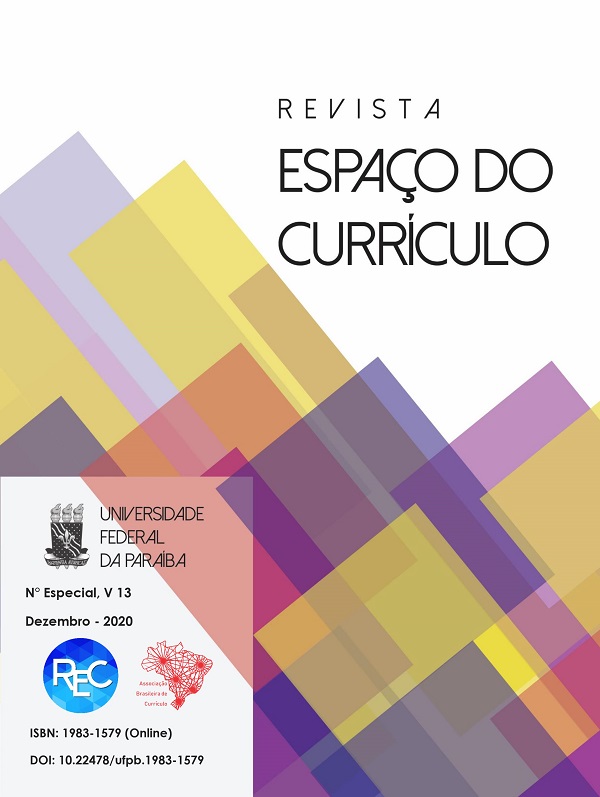EDUCATION FOR GLOBAL CITIZENSHIP
challenges for BNCC and teacher training
DOI:
https://doi.org/10.22478/ufpb.1983-1579.2020v13nEspecial.54368Keywords:
Curriculum, BNCC, BNC-Training, Global Citizenship, University educationAbstract
This article aims to present and discuss the concept of global citizenship. Our central problem is to reflect on the possibilities for the construction of Education for Global Citizenship (ECG) in the Brazilian context, establishing a relationship with the curricular debates, notably those that concern the Common National Curricular Base (BNCC) and the Common National Base for Initial Training for Basic Education Teachers (BNC-Training). In addition, to put the training contexts on the scene, we will present an exploratory study carried out with students from higher education, from different institutions in Brazil, whose objective was to know what students think about the process of education for global citizenship. The concept of education for global citizenship appears prominently in the 2030 educational agenda and in the Sustainable Development Goals (UNESCO, 2015), so that the implementation of the ECG pervades all levels of the educational system. If this idea appears in continuity with the guidelines promoted by international organizations, it is nevertheless contested and difficult to operate in national education systems. In addition to what is present in the official documents, it is fundamental to question how the curricula practiced in the courses in the areas already mentioned contribute (or not) to the understanding of what global citizenship is, with possibilities of building and reframing the concept of citizenship, aiming to expand it. it, from a critical perspective, encompassing aspects that go beyond overcoming intolerance and building a more solidary global thinking.
Downloads
Metrics
References
AKKARI, Abdeljalil et MALEQ, Kathrine. Global citizenship: Buzzword or new instrument for educational change? Europe's Journal of Psychology. 2019, vol. 15, no 2, p. 176-182.
ANDREOTTI, Vanessa Oliveira de. Soft versus critical global citizenship education. In: S. McCloskey (Ed.), Development education in policy and practice. London: Palgrave Macmillan, 2014, p. 21-31.
BRASIL. Resolução CNE/CP no. 2, de 20 de Dezembro de 2019. Define as Diretrizes Curriculares Nacionais para a Formação Inicial de Professores para a Educação Básica e institui a Base Nacional Comum para a Formação Inicial de Professores da Educação Básica (BNC-Formação), 2019.
BRASIL. Base Nacional Comum Curricular (BNCC). Educação é a Base. Brasília, MEC/CONSED/UNDIME, 2017.
BRASIL. Constituição da República Federativa do Brasil de 1988. Disponível em: http://www.planalto.gov.br/ccivil_03/constituicao/constituicao.htm. Acesso em 11/06/2020.
CARVALHO, J. M. de. Cidadania no Brasil: o longo caminho. 2 ed. Rio de Janeiro: Civilização Brasileira, 2002.
CORRÊA, Dárcisio. A construção da cidadania: reflexões histórico-políticas. 3.ed. Ijuí, RS: Ed. Unijuí, 2002.
DAVIES, Ian.; EVANS, Mark.; RIED, Alan. Globalising citizenship education? A critique of ‘global education’ and ‘citizenship education’. British Journal of Educational Studies, vol. 53, ed. 1, 2005, p. 66-89.
LILLEY, Kathleen; BARKER, Michelle; HARRIS, Neil. The global citizen conceptualized: Accommodating ambiguity. Journal of Studies in International Education, v. 21, 2017, p. 6-21.
MIEDEMA, Siebren; Bertram-Troost, GERDIEN. The Challenges of Global Citizenship for Worldview Education. The Perspective of Social Sustainability. Journal of Teacher Education for Sustainability, vol. 17, ed.2, 2015, p. 44-52.
OSLER, Audrey. Teacher interpretations of citizenship education: national identity, cosmopolitan ideals, and political realities. Journal of Curriculum Studies, vol. 43, ed.1, 2011, p. 1-24. https://doi.org/10.1080/00220272.2010.503245
PINSKY, Jaime. e PINSKY, Carla Bassanezi. História da Cidadania. São Paulo: Editora Contexto, 2008.
RHOADS, Robert.; SZELENYI, Katalin. Global citizenship and the university: Advancing social life and relations in an interdependent world. Stanford, CA: Stanford University Press, 2011.
RICHARDSON, G.; DE FABRIZIO, L.; ANSU-KYEREMEH, K. ‘It’s overwhelming and hard to articulate’: Analyzing student narratives of an international global citizenship education field experience. Global citizenship education in post-secondary education institutions: Theories, practices, and policies. New York: Peter Lang, 2011, p. 95-107.
SANTOS, Boaventura de Sousa. “Direitos humanos: o desafio da interculturalidade”. Revista Direitos Humanos, vol. 2, 2009, p. 10-18.
SKLAD, M.; FRIEDMAN, J.; PARK, E.; Oomen, B. ‘Going Glocal’: a qualitative and quantitative analysis of global citizenship education at a Dutch liberal arts and sciences college. Higher Education, vol. 72, ed. 3, 2016, p. 323-340.
STOER, S. R. MAGALHÃES, A. M. A reconfiguração do contrato social moderno: novas cidadanias e educação. In: RODRIGUES, David (org.). Perspectivas sobre a inclusão: da educação à sociedade. Porto Editora. Porto/Portugal, 2003.
TAWIL, Sobhi. Education for ‘Global Citizenship’: A framework for discussion. UNESCO Education Research and Foresight Working papers, vol. 7, 2013, p. 1-8.
UNESCO. Education 2030. Déclaration d’Incheon. Vers une éducation inclusive et équitable de qualité et un apprentissage tout au long de la vie pour tous. Paris: UNESCO, 2015.
Downloads
Published
How to Cite
Issue
Section
License
Copyright (c) 2020 Curriculum Space Journal

This work is licensed under a Creative Commons Attribution 4.0 International License.
By submitting an article to Curriculum Space Journal (CSJ) and having it approved, the authors agree to assign, without remuneration, the following rights to Curriculum Space Journal: first publication rights and permission for CSJ to redistribute this article. article and its metadata to the indexing and reference services that its editors deem appropriate.
















